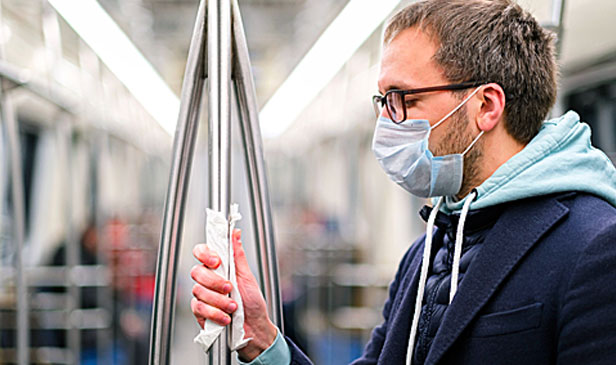News January 28, 2021
COVID Creates Havoc for European Promo in Q1
Spreading infections and societal lockdowns, along with importing issues and Brexit, are creating a deeply challenging quarter. Still, there is hope on the horizon.
COVID-driven societal lockdowns, rising coronavirus cases and deaths in some areas, importing issues and growing pains from Brexit are combining to turn Q1 2021 into one of the most challenging quarters the European promotional products industry has ever experienced.
Promo executives believe that the industry’s collective sales in both the United Kingdom and continental European countries will decline by double digits compared to the first quarter of 2020. Most feel the tough times will fuel a rise in promo business closures later in the year.

Even so, European promo leaders are cautiously optimistic that the business climate will improve as the coronavirus vaccination rollout accelerates and warmer weather returns, hopefully helping to reduce COVID infections and allowing for societal reopening, thereby creating conditions more favorable for commerce.
“When confidence returns to the economy, we will see a fast upturn,” said David Long, CEO/executive chairman of Sourcing City, a trade service organization that provides a suite of solutions to the U.K. promotional products industry.
Long continued: “This might not be for some months yet, and I would not expect to see sales levels returning to pre-pandemic figures for a while, but when the upturn comes, it should return restructured companies to profit relatively quickly.”
The Situation on the Ground
Before that hoped-for spring can commence, there’s some tough winter sledding to do.
With COVID-19 already spreading fast, and fears that new variants of the virus will further increase infection rates, both Germany and the U.K. have imposed strict societal lockdowns that aren’t poised to lift for weeks or potentially months. Portugal began a month-long lockdown in mid-January. France has a curfew in place and is considering entering another lockdown. COVID challenges have contributed significantly to plunging Italy into political turmoil. The list of issues and countries could go on.
Germany extended and toughened a partial lockdown until February 14, Chancellor Angela Merkel said Tuesday. https://t.co/fJr3AUDCFL
— The Local Germany (@TheLocalGermany) January 19, 2021
The restrictions have temporarily shuttered certain businesses (bars, for instance) and wiped out in-person events, including forcing the postponement of Europe’s biggest promo trade show, PSI Dusseldorf, until May. The COVID upheaval has also created ample uncertainty for businesses across nations and industries. These factors have combined to depress spend on promo throughout Europe in Q1.
“All countries are heavily affected and not sure what is coming next,” said Marcus Sperber, general partner at the Germany-based large promo supplier Elasto Form KG. “That causes limited sales in the promo market.”
Sperber estimated that promo sales across Europe will be down in Q1 by 25% to 30% compared to the first quarter of 2020. Alexandre Gil, chief financial officer at Portugal-headquartered supplier Stricker, is a bit more optimistic, predicting collective industry revenue will dip 10% to 15%. Long noted that most distributors and suppliers in the U.K. have been down 30% to 50% year over year.
“As an industry, we sit at the ‘sharp end,’ together with the hospitality and events sectors, and in return we are feeling the reduced spends in the total U.K. market quite significantly,” Long said.
Shipping Woes, Brexit Complications, Closures
Just like their counterparts in North America, promo firms in Europe are contending with soaring shipping costs and challenges in getting products from Asian factories to Western shores. It has to do with more expensive shipping containers and fewer ships available to transport goods. “On the freight market, we have a very bad situation with shipments from Asia, which are causing huge problems in the supply chain,” said Sperber.
Shipping challenges and rising raw material costs are poised to drive #promoproduct price hikes, as COVID lockdowns threaten promo supply chains in China. https://t.co/LEB3qf8qFj @asicentral @ASI_MBell @Melissa_ASI
— Chris Ruvo (@ChrisR_ASI) January 18, 2021
As this article details in depth, the shipping fiascos are another repercussion of COVID disruption. Some, like Gil, noted that many suppliers cut investments in stock in 2020 amid reduced market demand because of the coronavirus. “The exponential increase in container costs have reinforced this trend,” he said, adding this all could lead to inventory shortages at European suppliers when demand returns.
Some promo firms that operate across national boundaries in Europe said that Brexit is also complicating matters in Q1. Brexit refers to the United Kingdom’s political withdrawal from the European Union. A deal between the EU and the U.K. on the exit was reached in December 2020, which creates more certainty for trade relationships, said Long. Still, there are ongoing issues with which promo firms and other companies must contend, amplifying the challenges of an already difficult quarter.
“Brexit will continue to impose challenges around both importing and exporting for both the U.K. and the EU,” said Karl Whiteside, global managing director of Brand Addition (asi/202515), a worldwide distributor with operations in the U.K., Ireland, Germany, United States, Hong Kong and China.
Freight traffic through Holyhead down 50 per cent, reports @adavies4 as Irish hauliers bypass UK and #brexit paperwork. https://t.co/K8IOYSKxvG
— Georg von Harrach (@georgvh) January 22, 2021
Whiteside continued: “Additional requirements … are creating new delays in paperwork and the clearance process. The overall goal will always be to simplify this for our customers and to create a seamless cross-border transaction even as we face new charges for paperwork processing, clearance fees and product information that didn't exist prior to Brexit, or at least not at this level. The rules around each country’s relationship with the U.K. continue to evolve, so as time goes on, many of these rules will be better understood and hopefully easier to navigate.”
With all the challenges promo Europe is facing, executives believe that there will be an increase in industry companies going out of business in 2021. “To date, very few companies in the U.K. have folded, as this has mainly been prevented by companies using reserves or the government furlough scheme,” explained Long. However, “it seems inevitable that the industry will lose some companies this year. How many remains to be seen.”
There’s a similar outlook on the continent. Gil asserted that mid-sized companies could be hardest hit, as they have more overhead than small firms but lack the resources of large ones. The closures could accelerate from September on because “that will be the moment that bank moratoriums end and credit has to again be repaid,” Gil said.
Adaptation and the Turnaround
Despite the myriad hurdles and expected casualties, it’s not all gloom and doom in Europe. Strategic, adaptable companies have found ways to keep business moving, selling personal protective equipment, and providing kitted/drop-shipped promo solutions that often include products for use in the home office.
“In a time of social distancing and digital communication, there’s nothing like a physical gift to stand out and assure the maintenance of an emotional connection,” said Gil.
Smart promo firms have also been directing their sales and marketing efforts at industries that are thriving despite the pandemic – an approach that has helped keep sales of traditional promotional products moving. “Supermarkets, information technology and online retailers are three end-markets that are doing well,” said Long.
Sperber’s Elasto Form KG provides a notable example of pivoting successfully to keep sales streaming in. In spring 2020, the company built production lines to produce FFP2/N95-style masks. It has machines running around the clock. That’s enabled Elasto to be a leader in providing face masks. “The demand for local production – Made in Europe – is increasing and we also have huge demand for the masks worldwide,” said Sperber.

Marcus Sperber, Elasto Form KG
Indeed, many other manufacturers have also expanded their product range in recent months, or in some cases even changed it completely, in order to react to current needs, said Michael Freter, managing director of Germany-based PSI, Europe’s largest network of promotional products companies. Freter was ASI’s 2020 International Person of the Year. He noted that promo Europe’s pivot has been about more than just PPE/hygiene products.
“Many are also using the time to develop new products that will be launched on the market when the situation eases again,” said Freter. “This gives rise to hope and optimism.”
Sperber added that to survive as a business amid COVID, companies must “be open to the demands of the market, open to doing something new. The companies that fight hard, improve and digitalize their processes will come through the crisis.”
But just when will that crisis begin to abate? There’s a general opinion among European promo executives that the market will start to improve in the second quarter, but there’s not a consensus on when a return to “normalcy” and pre-pandemic revenue levels will occur.
The strength of recovery varies across countries. Growth will hinge on the severity of the health crisis, the extent of lockdowns & disruptions to activity, cross-border spillovers, and the effectiveness of policy support to limit persistent damage. #WEO https://t.co/yIs7h1GvE2 pic.twitter.com/NXAg9QcepR
— IMF (@IMFNews) January 27, 2021
“With hope for more vaccinations and rising temperatures come March, the economy could start to recover,” said Sperber. “Once bigger events can be held – like the European soccer championship that’s planned for this summer – it could help to boost the industry again. … I expect industry sales to be at their pre-COVID levels by 2023, but with disruptive market shares.”
Long said the U.K. industry should experience an improvement in business in the second quarter compared to Q1, but “not a particularly exciting one. The U.K. economy is sitting on substantial piles of cash at the moment, and there will be a time when this will be spent. The trouble is I have no idea when this might be.”
Gil thinks the second quarter will mark a positive turning point, with even better things to come in the latter half of the year.
“I expect that already in Q2 we can start to operate with some degree of ‘normalcy,’ ” Gil said. “From September on, I expect a huge boom in the overall indicators of the industry.”
Freter said that issuing a forecast for 2021 as a whole is difficult. Still, provided that the vaccine against virus becomes widely administered in the months ahead, he feels the economy in Europe will gradually pick up.
“I do not see a quick and complete return to the ‘old normal,’” he said. “What I do see, however, is the great optimism, will and effort with which our industry is defying the crisis. We can also sense this in the preparations for the PSI trade fair in Dusseldorf in May. Right now, the industry urgently needs a platform for dialog and a business restart. We can provide the best possible support here.”
